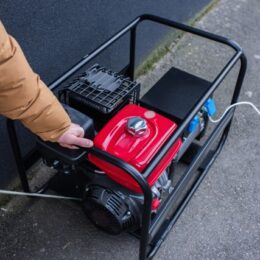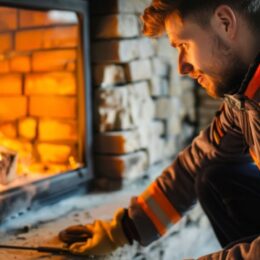
Michelle Study-Campbell, Chief Executive Officer of the Ronald McDonald House of Indiana, says her experience on the 1993 Rural Electric Youth Tour to Washington, D.C., as a high school senior was not only one of the best experiences of her life, but opened doors that led to college internships, a governor’s fellowship, grad school and to the high-profile not-for-profit “home away from home” for families of children being treated in Indianapolis-area hospitals.
Even as a college sophomore with little experience being interviewed, Michelle Study-Campbell said she knew this one was not going well.
Before a panel of politicos, she was applying for a statehouse internship for the 1996 legislative session. “As I was interviewing, I could see it was kind of flat. I wasn’t getting a lot of feedback,” she recalled.
Looking back to that interview, Study-Campbell, now 41, said despite her self-confidence and enthusiasm, she was at a disadvantage to some of the other applicants for the handful of positions: Her family lacked political connections. “My parents weren’t elected officials. They weren’t involved in party politics. We voted. We were informed, and that’s about it,” she noted. “I could tell the panel was like, ‘Eh, just another kid.’”
But she had one connection still to proffer to the panel: Her family’s dairy farm was connected to an electric cooperative. Through that connection, Michelle applied for and was selected to attend the Indiana Electric Youth Tour to Washington, D.C., a few summers earlier in 1992.
During that weeklong trip with 35 other high school seniors-to-be from all over Indiana, Study-Campbell not only visited Capitol Hill and the monuments, memorials and museums, but also was chosen as Indiana’s representative for the electric cooperative’s national youth leadership program. Then called the “Youth Consulting Board,” the program brought 36 select students from around the country back to Washington a month later for another week of what she said was like a leadership “boot camp.”
The group learned in-depth about advocacy, politics and policy from the professionals at the National Rural Electric Cooperative Association. They learned leadership, public speaking and other professional development skills. They learned the history of electric cooperatives. And they learned about themselves.
Six months later, in February 1993, the YCB delegates reconvened in Dallas, Texas, for the national electric co-op annual meeting where they assisted NRECA staff and the thousands of attendees from around the nation and world.
Study-Campbell drew on those “RE” connections to reset that interview before that panel for the statehouse internship …
“Then, I mentioned my D.C. experience through the REMCs,” she said, “and they perked up. They understood the REMCs. They knew this was something different they hadn’t seen in their other applicants. They started asking, ‘Do you know so-and-so?’ And I said, ‘Yes. I met them.’ It completely changed the demeanor and tone of the conversation.
“I knew, at that point, they were interested in learning more about me,” she recalled for directors and managers at the Indiana Electric Cooperatives’ annual meeting last month. “Had it not been that I could drop into the conversation this experience, I probably would not have gotten that internship.
“From that internship,” she continued, “I hustled and worked hard. That led to another internship which led to a governor’s fellowship which led to grad school — and to where I am today.”
‘To the service of others’
Today, Study-Campbell is the chief executive officer of the Ronald McDonald House of Indiana. She celebrated her first anniversary at the helm of the high profile, not-for-profit in Indianapolis Dec. 1.
Ronald McDonald House Charities is a global network of chapters providing a “home away from home” and comfort services for families with sick or injured children being treated at medical facilities. Though the houses were seeded with and receive operating dollars from the fast food corporation and franchises with which they share their namesake red-headed mascot, the chapters operate independently. Each is a self-sufficient entity and must raise the bulk of its funding on its own.
The Ronald McDonald House of Indiana has long been one of the main charities Indiana Electric Cooperatives has supported during its annual meeting (usually held in December). Beginning quietly in 1997 with the first Electric Consumer silent auction of handmade Christmas ornaments submitted by readers, support picked up steam 10 years later with the “Blue Ribbon Community Basket” auction provided by local co-ops. Indiana’s electric cooperatives have now raised over $100,000 for the Indianapolis Ronald McDonald House. The auction and donation drive from IEC’s annual meeting last month included participation from all 38 of the state’s electric cooperatives and raised a new record of almost $17,000.
A year ago, just weeks into her new position at Ronald McDonald House, Study-Campbell was reacquainted with Indiana’s electric cooperatives. During the 2014 donation presentation, she shared her Youth Tour background with IEC staff. She was invited to tell her story at a conference of co-op marketing and communications staff last October. She was asked to speak again at the 2015 IEC annual meeting, Dec. 7-8.
The annual meeting focused on the many ways Indiana’s not-for-profit, consumer-owned co-ops give back to their communities. This includes philanthropy and the youth programs like the Youth Tour to D.C. and the annual Youth Power and Hope Awards.

Michelle Study, then a high school senior from southeastern Indiana, offers directions and information to Hoosier attendees at the 1993 National Rural Electric Cooperative Association annual meeting in Dallas, Texas. As a participant on the 1992 Youth Tour to Washington, D.C., she was selected as Indiana’s delegate to NRECA’s Youth Consulting Board.
“It really left an indelible mark on me,” she said of the tour and subsequent youth leadership experience. “It was really the best experience of my life at 17. And to this day, it’s really right up there.”
Growing up on rural dairy farms in southeastern Indiana, Study-Campbell said she learned about hard work and responsibility. She said she was active but unfocused. “I never met a club or an opportunity I didn’t love,” she said.
Many of those activities, from 4-H to programs at the Catholic schools she attended to the Youth Tour, put community first and played up the notion of giving back and paying it forward.
Her mother, she said, was deeply affected by President John F. Kennedy’s call for public service beginning with his inauguration 55 years ago. “I’m a generation or so later,” Study-Campbell said, “but it still very much resonates with me in giving back.”
A print of Kennedy hangs in her office at the Ronald McDonald House.
It was Kennedy’s vice president, Lyndon Johnson, who actually sparked the idea for the Youth Tour. Speaking to the 1958 national meeting in Chicago when he was still a senator, Johnson suggested to the co-op leaders seated before him that co-ops take it upon themselves to bring the nation’s youth to Washington, D.C., so they could see firsthand how the government really works and what it stands for. Co-ops in Texas responded that year by sending small groups to work in congressional offices. Other states then joined in. Indiana’s electric co-ops sent their first tour group in 1960.
In 1964, NRECA began coordinating the tour with all the state electric cooperative associations as a national event.
Study-Campbell is the perfect case study of what the Youth Tour was and remains all about. “It ignited what began as a small interest in public policy and public affairs into a full-blown passion,” she said. “I have dedicated my life to the service of others. And really, it was thanks to this trip.”
In reliving memories and sharing photos with Indiana co-op leaders last month, she said she came home from the nation’s capital that summer ready to “take over the world.” “I believe I even told Congressman [Lee] Hamilton I was eyeing his seat,” she laughed. “The trip was a true confidence builder … maybe too much.”
She said before leaving on the tour she spent a lot of time thinking about what to pack — but not about the impact it would make once she got there. “I thought I was interested in the political side of things. But I began to understand the nuance and the difference between ‘politics’ and ‘policy.’ That trip fortified my interest in public service and policy.”
After graduating in 1993 from Oldenburg Academy, a private Catholic high school, she went on to Marian College (now University) in Indianapolis where she majored in communications and political science.
She followed that first internship at the Statehouse with another, then earned a prestigious Governor’s Fellowship during the O’Bannon administration. She then earned a Masters of Public Affairs from Indiana University.
‘A great place to be’
Study-Campbell worked with not-for-profit organizations and city and state offices through the 2000s, focusing much of her attention on health care and education-related issues. Becoming CEO of the Ronald McDonald House of Indiana, she said, is the culmination of a lot of steps in her life.
“It’s an opportunity that doesn’t come along very often,” she said. “And it’s a fantastic place that does really so much good each and every day. To be able to expand that and to serve more people and bring about a little comfort and care when families need it most … it’s a great place to be.”
The House, which opened in 1982 on the Indiana University-Purdue University Indianapolis campus near the Riley Hospital for Children, provides 52 rooms. Six more rooms are maintained inside Riley. But with almost 99 percent capacity every night at the House, she said there is need for expansion — as many as another 20-25 rooms.
While there are Ronald McDonald Houses in Evansville and Fort Wayne, and another being built in South Bend, the Indianapolis home naturally was Indiana’s first and is the state’s largest. It has served as a welcoming hostel for families facing the worst of times from all 92 Indiana counties, surrounding states and even countries on the other side of the world.
“A lot of times, our families arrive in the middle of the night behind the back of an ambulance…. They’ve driven through the night with a sick child…. They have the clothes on their back and probably an empty gas tank. They probably haven’t slept or eaten in days. They’re finally starting to get some answers on their child, and they can think about taking a nap and grabbing some food.”
She said providing that comfort and care has always been the cornerstones for the House. Now, she’s hoping to add a third “C” — connections.
“So many of our families come to us on the brink of that social self-sufficiency, and this one disruption is probably going to kick that family off that slope,” she explained. “They have been really struggling and focused on their child’s health for so long that at this point, they may have lost their job. And so we’re really going to bring to bear more information for statewide resources so that when they leave us, they’ve got more tools in the tool kit of life.
“We are not going to reinvent any social services, just connect people to resources in their community throughout the state or wherever they may be so they can provide a little bit better for their families when they go back to their community.”
‘Get on the bus’
During her tours down memory lane, Study-Campbell seems to share as much enthusiasm for Youth Tour as she did when she was on it the first time.

During a session of the Indiana Electric Cooperatives’ annual meeting in December, Michelle Study-Campbell shares the impact (and old photos) of her participation on the 1992 Rural Electric Youth Tour to Washington, D.C., when she was a high school senior. She was also selected for the follow-up leadership program that allowed her to attend the national meeting in February of 1993 in Dallas, Texas.
A strong advocate for continuing education and for people taking responsibility for self improvement, she said, “Education is really the only golden ticket.”
Youth Tour — an all-expenses-paid, life-changing event — is one of the great golden tickets available to Indiana’s rural and suburban teenagers. But to have a chance to take it, they must first apply. “A week out of your summer may seem like a long time and too much time away from your friends and family,” Study-Campbell would say to teens debating whether to apply. “But it is truly a week that will leave an impression and a mark on you for the rest of your life.
“And, as a young person who has either just now gotten the right to vote or is getting the right to vote soon, you want to be an engaged member of your society. Seeing your government up close and personal, and understanding how policy and procedures work and how that impacts you, is so critically important. So, take the opportunity.
“Go to Washington,” she said. “See what it’s all about. You will experience things you’ve only read about. And it could just be something that ignites a passion in you that will completely change the course of your future. So take the plunge. Get on the bus.”
Richard G. Biever is senior editor of Electric Consumer.
Michelle Study-Campbell and her husband, Michael Campbell, live in Indianapolis with their 2-year-old daughter.



